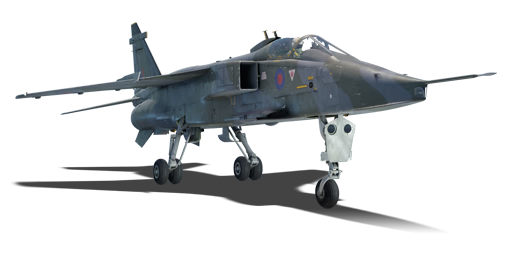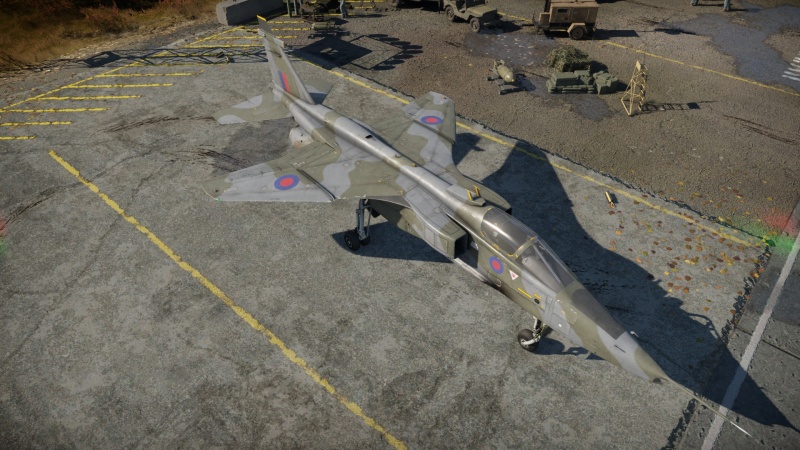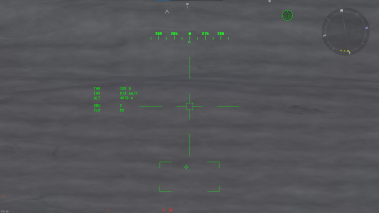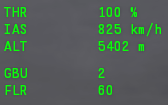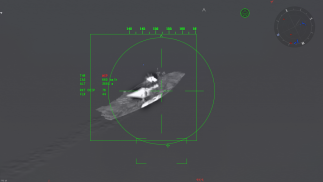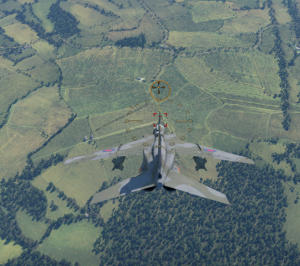Jaguar GR.1A
| This page is about the British strike aircraft Jaguar GR.1A. For other versions, see Jaguar (Family). |
Contents
Description
The Jaguar GR.1A is a rank VII British strike aircraft with a battle rating of 10.3 (AB) and 10.7 (RB/SB). It was introduced in Update "Ground Breaking".
General info
Flight performance
The Jaguar GR.1A handles nearly the same as the previous Jaguar GR.1. However, due to having access to the Rolls-Royce Turbomeca Limited Adour Mk.104, the acceleration, in-flight speed and max speed is significantly increased compared to the Rolls-Royce Turbomeca Limited Adour Mk.102. It maintains often the same flight performance and use with a slightly reduced turn-time at high speeds. It has the same loadout capacity as the previous Jaguar, performing nearly exactly the same with mounted ordnance. It should be noted that it is nowhere near on being the fastest plane at its battle rating but can become a forceful opponent when being hunted down, especially if the Jaguar has a speed advantage. Despite having a max speed of 1,540 km/h, the aircraft will not reach that speed even without load while flying at level flight, it is very situationañ. It is able to surpass the max speed at level flight up to 1,200 km/h but any sudden turn will tear apart the wings.
When on take-off:
Taking-off with the Jaguar GR.1A is pretty straight forward, no changes from the GR.1 with exception it reaches the minimum lift velocity faster than the GR.1. Flaps are not required for take-off even with the x8 1000lb bomb payload. However, it is recommended to be used for an easier take-off. Carrier take-off (unlikely to happen but can happen) are the same as normal ones but with a much shorter take-off time. Be aware of centering the aircraft correctly with the deck or else a landing gear might break.
When on landing:
Landings should be done below 500 km/h but depending on the situation, map and place where the Jaguar will land (aircraft carrier or airfield) this may vary. When landing on a carrier, maintain greater speeds than 360 km/h but less than 480 km/h, this is to ensure a safe pull up if the hook is missed. When landing on airfield, maintain greater speeds than 300 km/h but less than 450 km/h, this is to ensure the plane has enough strip to break and slowdown. When 300 km/h are hit while on the ground, a drag chute is launched to assist with the aircraft's slowdown. Use air-break in order to make a faster slowdown.
| Characteristics | Max Speed (km/h at 10,668 m) |
Max altitude (metres) |
Turn time (seconds) |
Rate of climb (metres/second) |
Take-off run (metres) | |||
|---|---|---|---|---|---|---|---|---|
| AB | RB | AB | RB | AB | RB | |||
| Stock | 1,557 | 1,540 | 13716 | 31.7 | 32.2 | 75.8 | 67.7 | 850 |
| Upgraded | ___ | ___ | __._ | __._ | __._ | __._ | ||
Details
| Features | |||||
|---|---|---|---|---|---|
| Combat flaps | Take-off flaps | Landing flaps | Air brakes | Arrestor gear | Drogue chute |
| ✓ | ✓ | ✓ | ✓ | ✓ | ✓ |
| Limits | ||||||
|---|---|---|---|---|---|---|
| Wings (km/h) | Gear (km/h) | Flaps (km/h) | Max Static G | |||
| Combat | Take-off | Landing | + | - | ||
| 1,273 | 481 | 926 | 525 | 410 | ~12 | ~6 |
| Optimal velocities (km/h) | |||
|---|---|---|---|
| Ailerons | Rudder | Elevators | Radiator |
| < 585 | < 600 | < 649 | N/A |
Engine performance
| Engine | Aircraft mass | |||||||
|---|---|---|---|---|---|---|---|---|
| Engine name | Number | Basic mass | Wing loading (full fuel) | |||||
| Rolls-Royce Turbomeca Limited Adour Mk.104 | 2 | 7,656 kg | 455 kg/m2 | |||||
| Engine characteristics | Mass with fuel (no weapons load) | Max Takeoff Weight | ||||||
| Weight (each) | Type | 15m fuel | 20m fuel | 30m fuel | 45m fuel | 51m fuel | ||
| 709 kg | Afterburning low-bypass turbofan | 8,632 kg | 8,916 kg | 9,546 kg | 10,491 kg | 10,909 kg | 13,500 kg | |
| Maximum engine thrust @ 0 m (RB/SB) | Thrust to weight ratio @ 0 m (WEP) | |||||||
| Condition | 100% | WEP | 15m fuel | 20m fuel | 30m fuel | 45m fuel | 51m fuel | MTOW |
| Stationary | 2,061 kgf | 3,354 kgf | 0.78 | 0.75 | 0.70 | 0.64 | 0.61 | 0.50 |
| Optimal | 2,313 kgf (200 km/h) |
3,585 kgf (200 km/h) |
0.83 | 0.80 | 0.75 | 0.68 | 0.66 | 0.53 |
Survivability and armour
The aircraft gets no extra armoured protection, therefore it`s extra weak against autocannons. The fuel tanks are self-sealing. This will help you a lot when getting shot at by enemy autocannons, but not air-to-air missiles, witch are very normal at this battle rating. As seen in the previous Jaguar, damage done to the engines will most likely result in making a non-recoverable maneuver and are prompt to catch fire easily. Keep this in mind when fighting other aircraft and SPAA. It has access to Radar Warning Receiver, meaning the pilot will realize when there is a radar who has a detected the plane (there will be a beeping sound) and a ping will be displayed on display which will activate on the HUD when there is a radar signal and when there is a radar lock there will be a continuous alert sound. This is useful when there is an aircraft with radar guided missiles and ground based radar anti air.
The use of chaff and flares significantly improves the survivability of the aircraft in all game modes. With the increasing passive guided missiles seen in Ground Realistic Battles, flares have been made a very useful tool to fight vehicles such as the Ozelot , Type 93 and SIDAM 25 (Mistral). However, chaff still remains useless against SPAA radars. The best countermeasure against them is to stay out of sight by flying too high or too low.
Modifications and economy
Armaments
| Ballistic Computer | |||
|---|---|---|---|
| CCIP (Guns) | CCIP (Rockets) | CCIP (Bombs) | CCRP (Bombs) |
| |
|
|
|
Offensive armament
The Jaguar GR.1A is armed with:
- A choice between two presets:
- 2 x 30 mm ADEN Mk.4 cannons, belly-mounted (150 rpg = 300 total)
- 60 x countermeasures + 2 x 30 mm ADEN Mk.4 cannons (150 rpg = 300 total)
Suspended armament
The Jaguar GR.1A can be outfitted with the following ordnance:
- Without load
- 2 x AIM-9G Sidewinder missiles
- 76 x CRV7 M247 rockets
- 72 x SNEB type 23 rockets
- 8 x 540 lb Mk.M1 bombs (4,320 lb total)
- 8 x 1,000 lb G.P. Mk.I bombs (8,000 lb total)
- 2 x AIM-9G Sidewinder missiles + 8 x 1,000 lb G.P. Mk.I bombs (8,000 lb total)
- 2 x AIM-9G Sidewinder missiles + 8 x 540 lb Mk.M1 bombs (4,320 lb total)
- 2 x AIM-9G Sidewinder missiles + 72 x SNEB type 23 rockets
- 2 x AIM-9G Sidewinder missiles + 76 x CRV7 M247 rockets
- 2 x AIM-9G Sidewinder missiles + 36 x SNEB type 23 rockets + 6 x 1,000 lb G.P. Mk.I bombs (6,000 lb total)
- 2 x AIM-9G Sidewinder missiles + 36 x SNEB type 23 rockets + 6 x 540 lb Mk.M1 bombs (3,240 lb total)
- 2 x AIM-9G Sidewinder missiles + 38 x CRV7 M247 rockets + 6 x 1,000 lb G.P. Mk.I bombs (6,000 lb total)
- 2 x AIM-9G Sidewinder missiles + 38 x CRV7 M247 rockets + 6 x 540 lb Mk.M1 bombs (3,240 lb total)
- 2 x AIM-9G Sidewinder missiles
- 76 x CRV7 M247 rockets
- 72 x SNEB type 23 rockets
- 6 x 540 lb Mk.M1 bombs (3,240 lb total)
- 6 x 1,000 lb G.P. Mk.I bombs (6,000 lb total)
- 2 x AIM-9G Sidewinder missiles + 6 x 1,000 lb G.P. Mk.I bombs (6,000 lb total)
- 2 x AIM-9G Sidewinder missiles + 6 x 540 lb Mk.M1 bombs (3,240 lb total)
- 2 x AIM-9G Sidewinder missiles + 72 x SNEB type 23 rockets
- 2 x AIM-9G Sidewinder missiles + 76 x CRV7 M247 rockets
- 2 x AIM-9G Sidewinder missiles + 36 x SNEB type 23 rockets + 4 x 1,000 lb G.P. Mk.I bombs (4,000 lb total)
- 2 x AIM-9G Sidewinder missiles + 36 x SNEB type 23 rockets + 4 x 540 lb Mk.M1 bombs (2,160 lb total)
- 2 x AIM-9G Sidewinder missiles + 38 x CRV7 M247 rockets + 4 x 1,000 lb G.P. Mk.I bombs (4,000 lb total)
- 2 x AIM-9G Sidewinder missiles + 38 x CRV7 M247 rockets + 4 x 540 lb Mk.M1 bombs (2,160 lb total)
- 2 x 546 kg Mk.13 bombs (1,092 kg total)
- 2 x 546 kg Mk.13 bombs + 2 x 540 lb Mk.M1 bombs (2,172 lb total)
- 2 x 546 kg Mk.13 bombs + 2 x 1,000 lb G.P. Mk.I bombs (3,092 lb total)
- 2 x 546 kg Mk.13 bombs + 2 x AIM-9G Sidewinder missiles (1,092 kg total)
- 2 x 546 kg Mk.13 bombs + 2 x AIM-9G Sidewinder missiles + 2 x 540 lb Mk.M1 bombs (2,172 lb total)
- 2 x 546 kg Mk.13 bombs + 2 x AIM-9G Sidewinder missiles + 2 x 1,000 lb G.P. Mk.I bombs (3,092 lb total)
Usage in battles
The Jaguar is a mostly an air-to-ground plane with defensive capabilities against aircraft. The role of the Jaguar is pretty straight forward when it comes to air battles: base bombing or ground/naval units bombing. It is recommended to utilize the different bomb payloads combined with flares or with the AIM-9G if the pilot wants. Rockets are not recommended to be taken as they are inaccurate and useless even with ballistics computer against lightly armoured vehicles. GBU's are the main weapon against any vessel. They are recommended to be used against destroyers, cruisers, or battleships in any sort of match, including enemy carriers. A well-placed Mk.13/18 is enough to make a carrier sink and will take considerably much less ordnance.
The Jaguar has a wide variety of payloads for all types of players, for those who want to be fast and engage bases or ground targets as quickly as possible and for those who want to carry out as much destruction as possible. The main advantage of the GR.1A over the rest is that the aircraft is able to carry AIM-9G and significant ground ordnance due to the on-wing pylons. The recommended payload for a fair trade in speed, firepower and defensive capabilities is the "2 x AIMG-9G + 6 x 1,000 lb G.P. Mk.I bombs" payload. More than enough bombs to take 2 bases in maps where there are only 3 bases and airfield or 1 of the 4 respawning bases like on Ruhr which take double the payload. Only 3 x 1,000 lb G.P. Mk.I bombs are needed per base when there are 3 bases. When in Ruhr or similar maps, bases take the whole 6 bombs and an extra 6 bomb run. If the player wants to play a more aggressive full bomb payload, then the "8 x 1,000 lb G.P. Mk.I bombs" payload should be carried. More than enough bombs to destroy the 3 bases in a 3 base map and still have enough payload for the airfield or a base and a half in maps like Ruhr. In enduring confrontation maps, any payload is recommended as EC is more forgiving payload wise as multiple strikes can be done to a base or an airfield.
Using Mk.13/18 GBU and TIALD laser designator
The Jaguar GR.1A brings completely new systems to the United Kingdom aircraft tech-tree, while similar to the French Jaguar A, it does has its changes, pros and cons. The guided munitions features have been seen in other aircraft in game such as the MiG-27M, MiG-23, A-7D and the like. However, the Jaguar GR.1A is the only top tier aircraft to not have access to guided missiles, only bombs.
TIALD laser designator
The TIALD is a new targeting pod added to the Jaguar GR.1A which, unlike the French Jaguar, the TIALD has access to thermal vision, making target acquision a much easier task. While in use, it acts very similar to helicopter gunner sights for modern helicopters, utilizing almost the exact same functions. Range is not displayed in the HUD as seen in helicopters. However, this is not a crucial aspect of accurate bombing as the range is fully dependent on the aircraft's attitude (altitude, speed, angle of attack, etc). If the user is familiar with helicopter HUD, you will be familiar with the indicators to the left of the reticle.
These indicators signal the following: THR (throttle), IAS (indicated air speed), ALT (altitude). These indicators will stay fixed to the sight regardless of the loadout. The lower indicators will vary according to the loadout carried at the time, in this case: GBU (Mk.13/18 guided bombs) and FLR (chaff and flares according to the loadout). The TIALD has a double functionality, not only works as the laser designator for GBU's but can work as an additional scouting tool for better situational awareness, both for air-ground and air-air. Functionalities of the TIALD will be explained further below.
Mk.13/18 GBU
The Mk.13/18 GBU are the first laser guided munitions seen in the UK. They are capable bombs able to one-hit kill any ground unit and cause significant damage to any vessel in game, including aircraft carriers. Unlike the rest of the unguided bombs, the GBU have extended range even if no lock is done. This is due to having surface controls that maintain the bomb leveled across the flight when there is no laser detection. In order to successfully do precision airstrikes, some basic keybind controls have to be done first for this to work properly. First, we must make sure we have the "Sight Stabilization" keybind under the Weaponry category of Aircrafts. Make sure to set it to an easy access keybind such as the letter "X" the Mouse Middle Button "MMB" or the key of your preference.
That being said, we will move to the next task. In order to properly make a laser lock, we must find a target that can be locked-on, this is easily achieved by using the thermal imagery on the TIALD targeting pod. If we have successfully acquired a target, a fully encolsed square will show on display around our target. A non-locked target will show the box as a stripped square. With a successful lock, GBU can be released in multiple ways. However, there are some things to keep in mind before dropping the GBU. If we have a locked-on target, hitting the "Sight Stabilization" key will pop up a circle over the box. The circle gives free camera motion while staying slaved to the movement of the target. This is particularily usefull when hitting moving enemies and compensate for speed or simply hitting more precise or wanted places. That being said, bomb release goes next. As discussed already, GBU tend to maintain a horizontal flight path if they do not have a laser lock, for this same reason the GBU must be dropped at an angle. This is particularily easy as the CCIP ballistic computer shows the general area of the impact zone. As long as bomb is released inside the circle of the CCIP marking, the bomb will precisely hit.
As soon as the bombs are released, they will instantly start to guide themselves towards the target as long as the laser lock is active. Keep in mind the bombs are dependent of gravity and are not self-propelled, so when attacking a moving target, make sure to compensate for the target's movement for a successful hit. As the bomb is mounted in an "X" shape on the aircraft, it will first fly in the aircraft's general direction in order to achieve a cross "+" shape, making it more evident which surface controls are elevators and rudders.
A single GBU is needed per ground target, not only because the bomb has the equivalent to 288kg of TNT, but the pinpoint accuarcy will, most of the time, hit the enemy vehicle's roof, making it a one-shot kill 99% of the time. Assault fuze is adviced here, no need for a time fuze for multiple reasons: There is no explosion self-damage risk as bombing will be done at stand-off distance, assault fuze will ensure the bomb explodes when it hits on target, in case target is not hit directly, reduced escape chances window is advisable.
Pros and cons
Pros:
- Good speed
- Excellent roll rate
- Decent turning circle
- Sufficient quantity of flares & chaff
- Good nose-mounted autocannon
- Wide variety of ordnance
- Effective air-to-air missiles
- Access to laser-guided bombs
- Air-to-air missiles are mounted on over wing pylons so you do not have to sacrifice any air-to-ground ordnance to carry them (unlike on the Jaguar GR.1 and Jaguar A)
- TIALD targeting pod has thermal imaging, unlike the ATLIS II targeting pod on the Jaguar A
Cons:
- Underwhelming stock performance
- Limited air-to-air ordnance
- Rather lacking ammunition for the 30 mm cannons
- Poor energy retention means that you bleed speed very quickly in turns
- Very high fuel consumption when using afterburner (more so than on other aircraft)
History
Describe the history of the creation and combat usage of the aircraft in more detail than in the introduction. If the historical reference turns out to be too long, take it to a separate article, taking a link to the article about the vehicle and adding a block "/History" (example: https://wiki.warthunder.com/(Vehicle-name)/History) and add a link to it here using the main template. Be sure to reference text and sources by using <ref></ref>, as well as adding them at the end of the article with <references />. This section may also include the vehicle's dev blog entry (if applicable) and the in-game encyclopedia description (under === In-game description ===, also if applicable).
Media
Excellent additions to the article would be video guides, screenshots from the game, and photos.
See also
External links
| SEPECAT | |
|---|---|
| Jet fighters | Jaguar A · Jaguar E · Jaguar GR.1 · Jaguar GR.1A · Jaguar IS* |
| SEPECAT was a joint venture between BAC (later BAe) and Bréguet (later merged with Dassault). Production were split between the two manufacturers. *Built by BAe and Hindustan Aeronautics Limited (HAL). | |
| Britain jet aircraft | |
|---|---|
| Blackburn | Buccaneer S.1 · Buccaneer S.2 · Buccaneer S.2B |
| British Aerospace | Harrier GR.7 · Sea Harrier FRS.1 (e) · Sea Harrier FRS.1 · Sea Harrier FA 2 |
| British Aircraft Corporation | Strikemaster Mk.88 |
| English Electric | Canberra B Mk 2 · Canberra B (I) Mk 6 · Lightning F.6 · Lightning F.53 |
| Gloster | Meteor F Mk 3 · Sea Meteor F Mk 3 · Meteor F Mk 4 G.41F · Meteor F Mk 4 G.41G · Meteor F Mk 8 G.41K · Meteor F Mk.8 Reaper |
| Javelin F.(A.W.) Mk.9 | |
| de Havilland | Vampire F.B.5 · Venom FB.4 · Sea Venom FAW 20 · Sea Vixen F.A.W. Mk.2 |
| Hawker | Sea Hawk FGA.6 · Hunter F.1 · Hunter F.6 · Hunter FGA.9 · Harrier GR.1 · Harrier GR.3 |
| Panavia | Tornado GR.1 · Tornado GR.4 · Tornado F.3 · Tornado F.3 Late |
| SEPECAT | Jaguar GR.1 · Jaguar GR.1A · Jaguar IS |
| Supermarine | Attacker FB 1 · Attacker FB.2 · Scimitar F Mk.1 · Swift F.1 · Swift F.7 |
| Foreign | Phantom FG.1 (USA) · Phantom FGR.2 (USA) · F-4J(UK) Phantom II (USA) |
| Australia | F-111C |
| India | ▄MiG-21 Bison |
| South Africa | ▄JAS39C |


